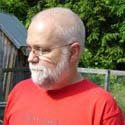"You got to walk that lonesome highway / you got to walk it by yourself." There's a whole cluster of folksongs & hymns that take up this theme of the individual confronted by meaningless nature. The solution, rejected by Wittgenstein, is usually some exterior force, a god or an ideology. And this leaves the traveller even more alone.
Philosophical Investigations
Christopher Robinson & Joseph Duemer read Wittgenstein's Philosophical Investigations
2.27.2003
2.26.2003
All right, glad to see you back. For the moment just a brief response. I've been thinking about two sorts of things recently: 1) The way that what we call the self is a provisional & ongoing process & 2) the way the "personal" works in poetry. Particularly 20th+ century poetry.
The only one of your statements [79] that gives me any pause at all is the first one & then only because that information about your work with the dying is that it may not be common knowledge among your friends. To someone who does not know you very well, your statement would present problems of verification. Perhaps, in your humility, you don't make this practice of yours public.
As for the others, my wife is the most beautiful woman I have ever seen, but that doesn't mean I won't accept your statement. Both statements can be true. It is delimited by the first person pronoun. Anyone with a wife will know what you mean. (This turns out to be more interesting that I first thought.) In the case of bench pressing, I could, as you say, drag you to the gym & make you prove it, but there is also a common sense objection--you don't look like a weight lifter.
More anon.
2.03.2003
So how did analytic philosophy become post analytic? It certainly did not come about through the work of continental philosophers. They were mostly ignored and, by and large, were content to explore continental philosophy, rather than engage in criticisms of the mechanistic research programme. Hence the development of the analytic/continental divide. [Philosophy.com]

